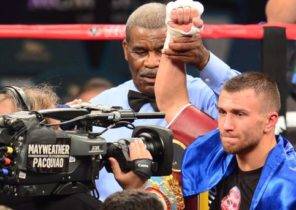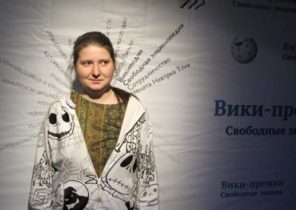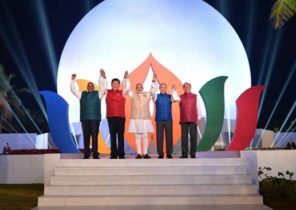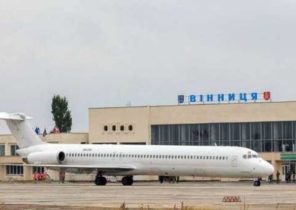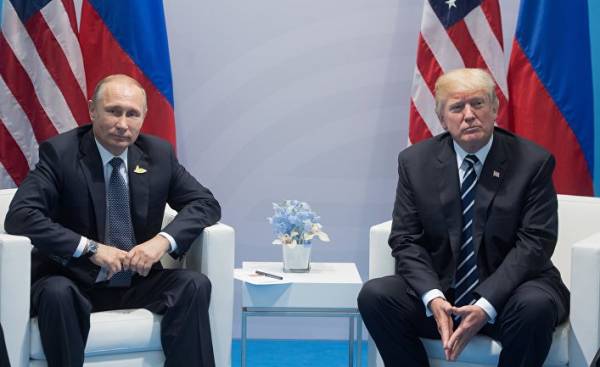
In Russia still there are those who enjoy watching the White house entangled in internal conflicts and suffering one setback after another, such as the failure to push through health care reform and the rapid appointment and dismissal of the foul-mouthed Director of communications Anthony of Scaramucci. Feeling the familiar Kremlin and the Republicans. Those who had six months of watching the trump occupying the presidency, experiencing a mixed feeling of disappointment and bad feeling.
President Vladimir Putin, apparently, very angry. Now he realized that putting on trump, made a mistake which was made before in respect of Western leaders. And his decision to send hundreds of diplomats and other employees of the US diplomatic mission in Russia shows he intends to cut its losses.
Putin should have seen it before. His close alliances with the West were waiting for the same fate. Jacques Chirac of France, Silvio Berlusconi in Italy or Gerhard schröder in Germany — all of these unions were built on personal contacts with applicants the head of state. Each time it was a new person and, as a rule, too boastful talker. Each of these unions was destroyed, when the leader is faced with constraints in a democratic society: terms, free press, independence of the legislature, the discontent of the electorate or any other “obstacle” in the form of checks and balances built into the Constitution of these countries. But with each new attempt to strike up a friendship with the West, Putin seems to have hoped that his colleagues will be able to overcome these obstacles, which limit their power — just as he did in Russia.
They’ve always disappointed him, did not meet expectations, although it was not as dramatic as in the case of the President trump. Less than a month since the first meeting of the two presidents in Germany during the G20 summit in Hamburg as of July 27, the US Congress has written to Trump the bill on new sanctions against Russia for its alleged intervention in the presidential election held in the United States last year. For many in Moscow, this bill was a proof that trump is a weak leader, unable to perform their resolute promises to “improve relations” with Russia. “Trump, inferior to their own legislators, is perceived in Russia as a weak politician,” writes the Russian analyst Alexei Makarkin, analyzing American the bill on sanctions.
But Makarkin missed one point — Putin seems unable to understand that the members of Congress, including Republicans, are not “private legislators” trump. They are an equal branch of government — like the judiciary, which has repeatedly blocked immigration initiative trump.
This is an incorrect interpretation of the boundaries of Executive power has existed since the first years of Putin’s presidency, when he established control over the Russian media and thought that his Western colleagues can do the same in their countries. In 2005, during a summit with President George Bush, Putin refused to believe that the Supreme commander of the United States has no authority to silence American journalists. Remembers Bush, Putin said: “do Not tell me about the free press. Not after you fired that reporter.”
Bush realized that Putin has in mind. “Vladimir, are you talking about Dan Rather?”, he wanted to know. A few months before this experienced journalist rather was forced to apologize and resign from his post leading the evening news on CBS, but not on the order of the White house, but because of the incorrect story about Bush’s service in the National guard. According to Putin, this incident showed that the US claims the freedom of the press is a sham. Bush tried to convince him otherwise. He recalls that he told then Russian President: “I urge you not to talk about it publicly. Americans may think that you don’t understand our system.”
But the fact is that he doesn’t understand. Within a few years of working as a journalist in Moscow, I’ve lost count of the officials who tried to explain to me that there is no such thing as an independent journalist. And one official even started our interview, saying that all American journalists secret agents undercover. Taking me in your office in 2013, Pavel Astakhov, who occupied then a post of the Ombudsman for children met me with a cheerful shouting: “here, CIA! Let him in!”
He wasn’t kidding. In the Russian environment officials (and in society in General) believe that the West in many ways similar to Russia, with the same tame judiciary, including obsequious media and the same ruling cabal that is pulling all the strings. This picture of the world makes it that much easier to dismiss criticism coming from abroad — if all are corrupt then no one has the right to judge. But it turns out that many high-ranking officials in Moscow think so too.
They are, for example, believed that trump would be able to act contrary to the opinion of representatives of other branches of government and to implement its agenda, especially in matters concerning the easing of sanctions against Russia. Deep down they believe that power in the United States, as in Russia, concentrated in the hands of the leader, and everything else is just a democratic smokescreen.
And it is unlikely this belief will be changed in the light of recent lessons on the basics of American civil law. Russian state television the failure of trump to force to silence the media and to push its agenda through Congress and the courts presented only as another proof that the United States operated by a powerful gang of conspirators — only this time it is against the President of the United States.
This is a new twist to the old and familiar story, and it means that the Kremlin still cherishes the hope that trump will take the American system under control and guide it toward an Alliance with Moscow. “We’ve been expecting, maybe something will change for the better, had such a hope that the situation will change, — said on Sunday Putin. — But, apparently, if it changed, it’s not soon.”

